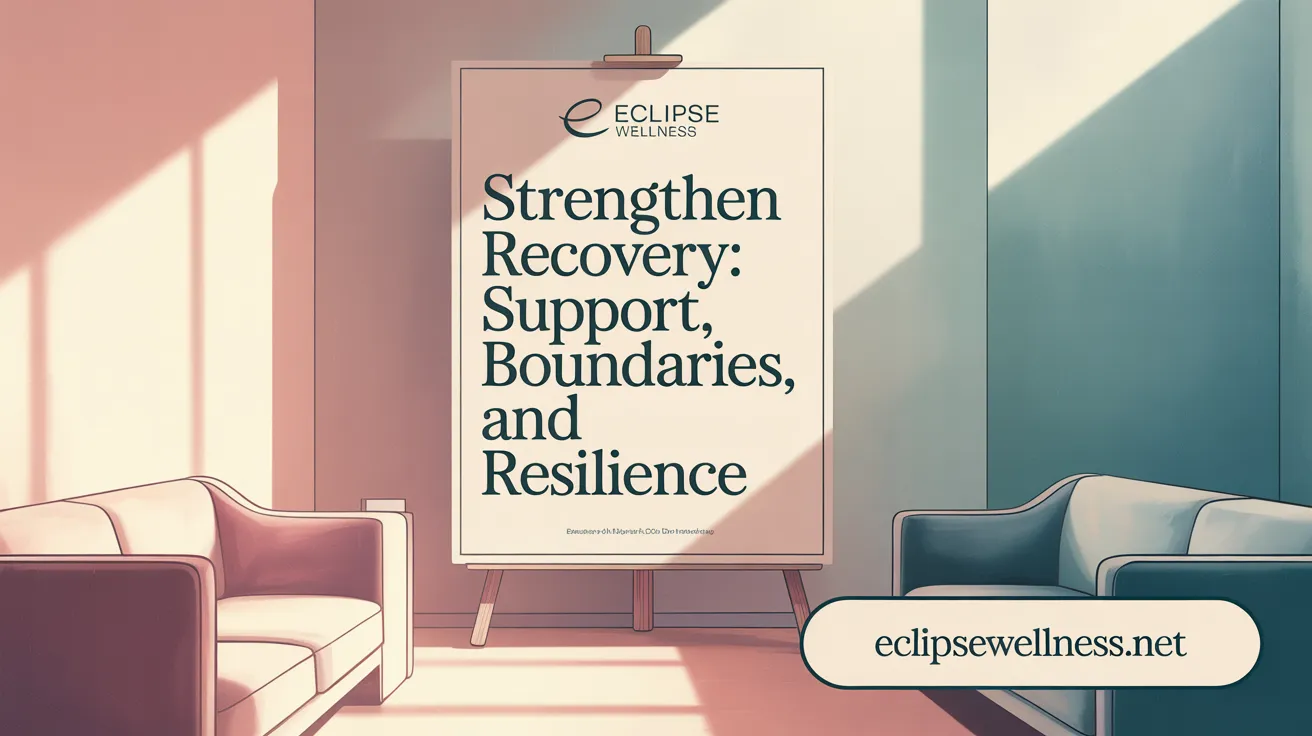Understanding the Path of Addiction Recovery
Stages of addiction recovery
Addiction recovery is a gradual process that unfolds through several stages, each presenting unique challenges and opportunities for growth. Commonly, these stages are precontemplation, contemplation, preparation, action, and maintenance.
- Precontemplation: Individuals may not recognize their substance use as a problem and often resist treatment efforts.
- Contemplation: Awareness grows, and ambivalence about change becomes apparent.
- Preparation: Plans for recovery take shape, including seeking professional help.
- Action: Active changes occur, such as beginning treatment and altering behaviors.
- Maintenance: Focus shifts to sustaining sobriety and preventing relapse.
The non-linear nature of recovery
Recovery journeys are rarely straightforward; progressing through stages can be a cyclical process. Individuals may revisit earlier stages or experience relapse, which is a common part of healing rather than a failure. Compassion and patience are vital, as setbacks offer valuable learning experiences that strengthen long-term recovery.
Importance of tailored support and relapse as part of the journey
Each person's recovery path is unique, influenced by their experiences, needs, and challenges. Tailored support—such as motivational interviewing, psychoeducation, and culturally sensitive programs—enhances engagement and success.
Relapse does not signify defeat; instead, it underlines the chronic nature of addiction, emphasizing the need for ongoing care and flexible strategies to maintain sobriety. Holistic approaches that incorporate emotional, physical, social, and spiritual support foster resilience and well-being throughout the recovery continuum.
The Foundation of Compassion in Addiction Treatment
Role of compassionate care in treatment
Compassionate care is essential in addiction treatment, fostering a safe and supportive atmosphere where individuals feel understood and respected. This approach acknowledges addiction as a complex disease influenced by psychological, social, and biological factors, moving away from judgment and stigma. Healthcare providers who demonstrate empathy can improve treatment engagement and retention, enhancing the likelihood of successful recovery. For more, see Compassionate Addiction Treatment and The Importance of Compassionate Care in Addiction Treatment.
Building trust and reducing stigma
Trust develops when patients experience compassionate interactions, which helps reduce feelings of shame and guilt often associated with addiction. Compassionate care promotes dignity and respect, enabling individuals to openly discuss their struggles without fear. By actively addressing stigma, addiction treatment becomes more accessible and acceptable, encouraging those affected to seek help and adhere to treatment plans. Learn more at Understanding Addiction and Reducing Stigma and The Value of Compassion in Addiction Treatment and Recovery.
Emotional healing through empathy
Empathy supports emotional healing by validating feelings and experiences related to underlying trauma and pain that often accompany addiction. In an empathetic environment, people in recovery can process their emotions safely, fostering resilience and hope. This emotional support is crucial for addressing co-occurring mental health conditions and sustaining long-term sobriety. See Managing Co-Occurring Disorders with Integrated Care and Emotional Regulation Techniques.
Importance of family involvement
Including family in compassionate care strengthens recovery by educating and supporting loved ones, enhancing the patient’s social support network. Family involvement helps repair relationships damaged by addiction, promotes understanding of the disease, and provides emotional encouragement. Compassionate family therapy can reduce conflict and build healthier dynamics conducive to lasting recovery. Explore Supporting Loved Ones Struggling with Addiction and Compassionate Support for Addiction Recovery.
Creating safe, non-judgmental environments
Addiction treatment centers that prioritize safety and non-judgment foster openness and trust. Avoiding punitive language and encouraging peer support contribute to a healing space where individuals feel valued and empowered. Such environments support personalized treatment plans and trauma-informed care, essential elements for holistic treatment approaches addressing mind, body, and spirit. For further reading, see Holistic Therapy for Addiction Treatment and Comprehensive treatment programs and personalized recovery plans.
Integrating Self-Compassion and Mindfulness for Resilience

What is self-compassion and how does it benefit recovery?
Self-compassion means treating oneself with kindness, understanding, and patience, especially during challenging moments. It helps reduce harsh self-criticism and builds resilience, promoting emotional well-being. In addiction recovery, it supports individuals as they navigate setbacks by fostering self-forgiveness and recognizing progress, no matter how small. This compassionate stance encourages a positive mindset and decreases feelings of shame and guilt (Self-Compassion During Addiction Recovery, self-compassion in substance use disorders).
How can mindfulness practices support recovery?
Mindfulness involves fully engaging with the present moment in a non-judgmental way. Techniques like deep breathing, meditation, yoga, and mindful walking help manage emotions and reduce stress, which is crucial in preventing relapse. Regular mindfulness practice enhances emotional regulation and self-awareness, allowing individuals to respond to cravings and psychological distress more effectively (Mindfulness in Addiction Recovery, Mindfulness Practices for Emotional Management).
What techniques build self-compassion during recovery?
Building self-compassion can start with positive self-talk—replacing self-critical thoughts with encouraging and nurturing language. Forgiveness, especially after setbacks, shifts the focus from blame to learning and growth. Daily rituals such as journaling, gratitude exercises, and meditation cultivate kindness towards oneself. Setting personal boundaries and prioritizing self-care also fortify resilience and sustain recovery efforts (Practicing self-compassion during addiction recovery, Self-Compassion and Emotional Resilience).
How do self-compassion and mindfulness help manage psychological distress?
Both self-compassion and mindfulness improve emotion regulation by helping individuals accept difficult feelings without judgment. This acceptance reduces anxiety, depression, stress, and thought suppression that often accompany substance use disorders. By fostering emotional resilience, they serve as protective factors against relapse and support sustained recovery (The Predictive and Mediating Role of Self-Compassion, Self-compassion and Emotional Regulation).
What resources support the development of self-compassion in recovery?
Support networks including therapists, counselors, support groups, and recovery communities provide encouragement and shared understanding. Specialized resources like The Walker Center offer free guides and journals to help individuals incorporate self-compassion and mindfulness into their routines. Integrating these practices within a holistic treatment approach and comprehensive, personalized treatment plan enhances long-term recovery outcomes (Support Networks for Recovery, Comprehensive Addiction Recovery Approaches, Navigating Addiction Recovery Strategies).
Holistic and Integrative Therapies Supporting Recovery

What are holistic treatment approaches and elements?
Holistic addiction treatment addresses the whole person, focusing on five interconnected elements: physical, emotional, social, spiritual, and intellectual well-being. This comprehensive view recognizes that addiction impacts all these areas and recovery benefits from balance among them. For more on holistic treatment approaches, see this resource.
What are common holistic therapies used in addiction treatment?
Holistic therapies often include yoga, meditation, acupuncture, massage therapy, art and music therapy, animal-assisted therapy, breathing exercises, tai chi, nutritional counseling, and life skills development. These therapies help manage stress, improve emotional regulation, facilitate spiritual growth, and strengthen physical health. Explore a variety of holistic therapy methods and holistic addiction treatment programs for deeper insights.
How are holistic therapies combined with evidence-based treatments?
Integrative approaches blend holistic therapies with traditional medical and behavioral care such as cognitive-behavioral therapy (CBT), medication-assisted treatment (MAT), and counseling. For example, mindfulness practices complement CBT by enhancing emotional awareness and relapse prevention skills. Acupuncture and yoga can support detoxification and reduce withdrawal symptoms. More information about integrative therapy for addiction recovery is available.
What benefits does holistic care provide in relapse prevention and emotional regulation?
Holistic care promotes mind-body harmony, which aids in managing cravings, reducing stress, and improving mood stability—key factors in relapse prevention. Emotional healing through creative and mindfulness therapies fosters resilience and healthier coping strategies. Physical therapies like exercise and nutrition restore energy and improve overall well-being. Together, these approaches empower individuals to sustain recovery by addressing root causes and promoting long-term health. See Holistic Therapy for Addiction Recovery, Comprehensive Addiction Recovery Approaches, and holistic treatment for drug addiction for more details.
Navigating Treatment Systems and Sustaining Long-Term Recovery

Assessment and individualized treatment planning
The journey to recovery begins with a thorough substance use assessment conducted by qualified professionals. This critical step ensures that treatment plans address the complex physical, psychological, emotional, and social needs unique to each individual. Personalization of care facilitates more effective interventions tailored to the severity of the disorder, co-occurring conditions, and individual circumstances.
Medication-assisted treatment and behavioral therapies
Effective addiction treatment commonly combines medication-assisted treatment (MAT) with behavioral therapies. MAT utilizes FDA-approved medications such as methadone, buprenorphine, and naltrexone to reduce cravings and withdrawal symptoms, particularly in opioid use disorders. Complementary behavioral therapies—including cognitive-behavioral therapy (CBT), motivational interviewing, contingency management, and family therapy—equip individuals with skills to modify behaviors, manage triggers, and build coping strategies essential for lasting recovery.
Integrated care for co-occurring disorders
For individuals facing both substance use and mental health disorders, integrated care models are the gold standard. By coordinating mental health and addiction treatment within a unified framework, integrated services improve psychiatric symptoms and boost recovery outcomes. This approach ensures no “wrong door” for patients, providing seamless screening, referral, and treatment that address both conditions concurrently, thus enhancing overall quality of life.
Aftercare, support networks, and relapse prevention strategies
Sustaining long-term recovery relies heavily on aftercare, including participation in support groups, recovery coaching, and structured relapse prevention frameworks. Building and maintaining a robust support system encompassing family, peers, and professional counselors fosters social reintegration and emotional resilience. Relapse is recognized as a common stage rather than failure, guiding adjustments in care with compassion and strategic planning.
Ongoing professional support and recovery resources
Continuous access to professional support—such as outpatient therapy, medication management, and holistic treatment approaches—is vital for tackling challenges as they arise. Resources like SAMHSA’s treatment locators and recovery campaigns provide practical assistance, education, and community connection. Holistic approaches complement medical and psychological treatments by nurturing mind-body-spirit alignment, reinforcing self-care routines, and promoting overall wellness to sustain recovery momentum.
Building Strong Support Systems and Personal Boundaries

Why is social support important in addiction recovery?
Social support plays a crucial role in sustaining recovery by providing encouragement, accountability, and a sense of belonging. Connecting with friends, family, recovery groups, or counselors helps individuals feel understood and less isolated, boosting motivation and resilience.
How can personal boundaries be effectively set and maintained?
Setting boundaries means protecting your well-being by saying no to situations or people that may trigger relapse or stress. This includes refusing offers of alcohol or drugs, prioritizing your needs, and communicating limits clearly. Maintaining these boundaries requires patience, self-respect, and ongoing self-compassion in substance use disorders.
What role do family and peers play in recovery?
Family involvement can strengthen recovery by offering emotional support, fostering a substance-free home environment, and participating in education or therapy sessions. Peer support groups provide shared experiences, emotional understanding, and practical advice, enhancing recovery through community.
How can support be sustained during challenging times like holidays?
Holidays often bring stress and exposure to triggers. Preparing with a recovery plan, maintaining self-care routines like meditation or exercise, and connecting with sober support networks can help manage emotions and prevent relapse during these vulnerable periods. For more information on managing holidays in recovery, see Navigating alcohol addiction recovery during holidays and Holiday stress and addiction relapse.
How do positive coping mechanisms and self-care contribute to recovery?
Developing healthy coping skills such as mindfulness, journaling, exercise, and meaningful activities helps manage cravings and emotional stress. Prioritizing balanced nutrition, adequate sleep, and setting daily rituals nurtures mental and physical well-being, reinforcing long-term sobriety. Learn more about self-compassion and emotional resilience and practicing self-compassion in addiction recovery.
